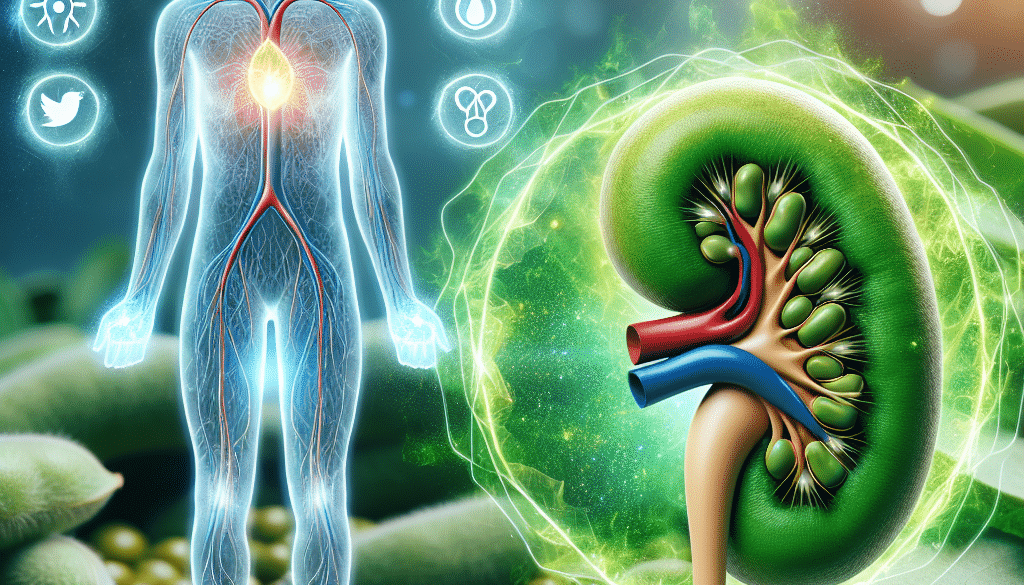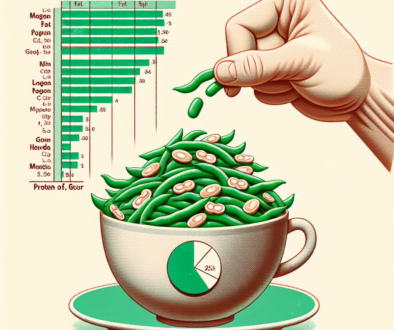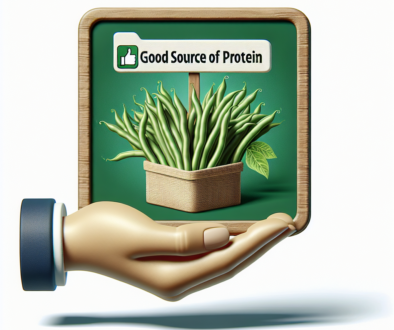Is Mung Beans Good For Kidney?
-
Table of Contents
- Mung Beans and Kidney Health: A Nutritional Powerhouse
- The Nutritional Benefits of Mung Beans
- Impact of Mung Beans on Kidney Health
- Research on Mung Beans and Kidney Health
- Dietary Considerations for Kidney Disease Patients
- Incorporating Mung Beans into a Kidney-Friendly Diet
- Conclusion: Mung Beans as a Kidney Health Ally
- Discover ETprotein’s High-Quality Protein Products
Mung Beans and Kidney Health: A Nutritional Powerhouse

Kidneys are vital organs that play a crucial role in maintaining overall health by filtering waste products, excess water, and other impurities from the blood. Diet plays a significant role in kidney health, and incorporating kidney-friendly foods is essential for those looking to maintain or improve their renal function. Mung beans, a staple in many Asian cuisines, have been touted for their health benefits, but are they good for the kidneys? This article delves into the nutritional profile of mung beans and their impact on kidney health.
The Nutritional Benefits of Mung Beans
Mung beans are small, green legumes that are packed with nutrients. They are an excellent source of protein, fiber, vitamins, and minerals. Here’s a breakdown of their nutritional content:
- High in protein: Mung beans are a great source of plant-based protein, which is essential for muscle repair and growth.
- Rich in dietary fiber: The fiber in mung beans helps promote digestive health and can aid in preventing constipation.
- Low in sodium: A diet low in sodium is crucial for maintaining healthy blood pressure levels, which is beneficial for kidney health.
- Contains potassium: While high levels of potassium can be harmful to individuals with kidney disease, it is an essential mineral for those with healthy kidneys.
- Provides vitamins and minerals: Mung beans are a good source of B vitamins, magnesium, zinc, and iron, which are important for various bodily functions.
Impact of Mung Beans on Kidney Health
For individuals with healthy kidneys, mung beans can be a nutritious addition to the diet. However, for those with kidney disease, it’s important to consider the following factors:
- Potassium Content: Mung beans contain potassium, which in high amounts can be dangerous for people with advanced kidney disease. It’s essential to monitor potassium intake to avoid hyperkalemia, a condition characterized by high potassium levels in the blood.
- Protein Quality: While mung beans are a good source of protein, those with kidney disease may need to limit their protein intake to reduce the kidneys’ workload. Plant-based proteins like mung beans are often recommended over animal proteins as they are easier on the kidneys.
- Phosphorus Levels: Mung beans contain phosphorus, which needs to be regulated in a kidney-friendly diet. Excessive phosphorus can lead to bone and heart issues in individuals with kidney disease.
Research on Mung Beans and Kidney Health
Several studies have investigated the effects of mung beans on kidney health. For example, research has shown that mung bean extracts may have protective effects against kidney damage in diabetic rats. Another study suggests that the antioxidants in mung beans can help reduce oxidative stress, which is beneficial for kidney health.
However, it’s important to note that most research has been conducted on animals or in vitro, and more human studies are needed to fully understand the impact of mung beans on kidney health.
Dietary Considerations for Kidney Disease Patients
For those with kidney disease, it’s crucial to follow a diet that supports kidney function. This typically involves:
- Limiting sodium intake to control blood pressure.
- Monitoring protein consumption to reduce kidney strain.
- Regulating potassium and phosphorus intake to prevent complications.
- Staying hydrated by drinking adequate amounts of water.
It’s essential for kidney disease patients to consult with a healthcare provider or dietitian to create a personalized eating plan that takes into account their specific nutritional needs.
Incorporating Mung Beans into a Kidney-Friendly Diet
For those with healthy kidneys or mild kidney issues, mung beans can be a beneficial addition to the diet. They can be enjoyed in various forms, such as whole beans, sprouts, or as flour. Here are some kidney-friendly ways to include mung beans in your meals:
- As a protein-rich addition to salads and soups.
- Incorporated into vegetable stir-fries for added texture and nutrients.
- Used to make mung bean pancakes or crepes as a high-fiber breakfast option.
- Blended into smoothies or shakes for a protein boost.
Conclusion: Mung Beans as a Kidney Health Ally
In conclusion, mung beans can be a nutritious part of a diet aimed at promoting kidney health, especially for those with healthy kidneys. They offer a range of essential nutrients that support overall well-being. However, individuals with kidney disease should approach mung beans with caution and seek advice from healthcare professionals to ensure their diet aligns with their health needs.
Discover ETprotein’s High-Quality Protein Products
If you’re looking for plant-based protein options that are kidney-friendly, consider ETprotein’s range of products. ETprotein specializes in organic bulk vegan proteins that are non-GMO and allergen-free, making them an excellent choice for those looking to support their kidney health through diet.
ETprotein’s mung bean protein is a standout product that provides a high-quality protein source without the additives found in many other protein supplements. Whether you’re managing kidney health or simply looking to incorporate more plant-based proteins into your diet, ETprotein has options to suit your needs.
About ETprotein:
ETprotein, a reputable protein and L-(+)-Ergothioneine (EGT) Chinese factory manufacturer and supplier, is renowned for producing, stocking, exporting, and delivering the highest quality organic bulk vegan proteins and L-(+)-Ergothioneine. They include Organic rice protein, clear rice protein, pea protein, clear pea protein, watermelon seed protein, pumpkin seed protein, sunflower seed protein, mung bean protein, peanut protein, and L-(+)-Ergothioneine EGT Pharmaceutical grade, L-(+)-Ergothioneine EGT food grade, L-(+)-Ergothioneine EGT cosmetic grade, L-(+)-Ergothioneine EGT reference grade and L-(+)-Ergothioneine EGT standard. Their offerings, characterized by a neutral taste, non-GMO, allergen-free attributes, with L-(+)-Ergothioneine purity over 98%, 99%, cater to a diverse range of industries. They serve nutraceutical, pharmaceutical, cosmeceutical, veterinary, as well as food and beverage finished product distributors, traders, and manufacturers across Europe, USA, Canada, Australia, Thailand, Japan, Korea, Brazil, and Chile, among others.
ETprotein specialization includes exporting and delivering tailor-made protein powder and finished nutritional supplements. Their extensive product range covers sectors like Food and Beverage, Sports Nutrition, Weight Management, Dietary Supplements, Health and Wellness Products, and Infant Formula, ensuring comprehensive solutions to meet all your protein needs.
As a trusted company by leading global food and beverage brands and Fortune 500 companies, ETprotein reinforces China’s reputation in the global arena. For more information or to sample their products, please contact them and email sales(at)ETprotein.com today.














